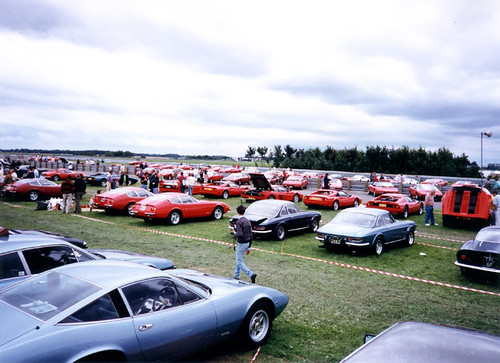
I said I would write a bit more about my liking for the automobile and so here we go.
I was insane for cars - and specifically Italian cars - in my youth. I dragged my parents and my mates round to many car events. I even met Nick Mason from Pink Floyd once and I didn't give a shit about his day job back then, he was famous to me as a collector and racer of Ferraris.
Author, philosopher and social commentator Jeremy Clarkson once described his love of cars as a sort of admiration for someone's desire to make an object that exists for no really good reason other than to make people's lives a bit more enjoyable. It's a good way of looking at the car and particularly fast, extravagant cars that might get the 'eco-mentalists' (as Clarkson calls them) up in arms.
I'm as appalled as anyone when driving along down the M1 looking at a procession of very large, expensive, uneconomical BMWs, Mercedes' and the like bomb past me with one person sitting inside. Motorway driving isn't fun. Sure, it should be comfortable but buying a flashy car to do the daily commute is exceptional twattery. Same goes for vulgar displays of wealth - gold plated Lamborghinis bought with oil money that will never venture beyond a lap of the block round Harrods are equally aggravating. And don't get me started on tenuous, personalised number plates. If you want to write your name on your car, just write it on it. Maybe put a price tag on it too.
They say the automobile will successfully end the world within 150 years of it's invention. Not necessarily through pollution but through other knock-on effects, the main one being obesity in it's drivers who take a 3 and half litre saloon car a half a mile round the corner to pick up a takeaway.
However, things weren't always this way. Ferrari (like a lot of sports car makers) started life as a racing team. The road cars were a sideline to fund competition. And the early road cars were literally beaten out of metal by some guys in a shed. Extravagance didn't come into it. What mattered was speed and efficiency. Usually at the expense of attention to detail, comfort and reliability. What matters about those cars is what occurs inside them, between the driver and the machinery. If that all sounds a bit POWER and homoeroticism then think of it as a contrast to modern supercars - where what matters is outside them, between the driver and the people looking at him or her.
The 1980s changed all that. The classic car market experienced a boom so colossal that it was possible to make a 100% profit on a brand new Ferrari just by driving it out of the showroom. It changed people's attitudes to older cars. Rather than being charismatic machines for racing and for fun, they now became investments. It also gave people a motive to dig up the rusted remains of pretty much anything and rebuild it, meaning long-lost cars were suddenly re-emerging in perfect condition and giving a perfect real-life example for the metaphor of "Grandpa's Broom". It culminated in Lord Brocket, who played polo with Prince Charles, pulling an insurance scam by dismantling and burying some of his classic car collection in order to fake a robbery. Classic cars back then were currency.
In the 70s if you drove a Ferrari you obviously had a bit of money. But the cars could be a pain in the arse so it was assumed that, by sacrificing a bit of reliability and comfort in the name of style, you at least had some taste. The 80s changed that because suddenly the most vulgar display of personal wealth available was a classic car. It also seemed to infiltrate the Ferrari designs of the time too. The Testarossa is undoubtedly a striking icon of the 1980s but is it beautiful? Nope. Compare it to it's predecessor, the Boxer, in it's original 365 BB form and it's like comparing a marathon runner and a bodybuilder. Because I grew up in the 80s I still find cars like the Testarossa or the Lamborghini Countach exciting but as pieces of design they're going to need a few decades yet before they can be separated from the money-grabbing era that spawned them. For me, the last truly beautiful Ferrari was the 308 GTB. And even that grew bulges and wings over time.
Anyway, it's perfectly acceptable for a chap of my age to know plenty about guitars (for example). I know plenty about guitars and whilst it's jovially referred to as geeky from time to time, it's accepted as being OK. Same goes for records. You can identify a first press from a re-press and as long as you don't get too 'real ale' about it you're OK. But mention cars and you're fucked. Somehow, it's not cool in the circles I move in. They represent crass displays of money and macho one-upmanship.
I want to make a stand for the automobile. Not the modern automobile. Not four wheel drive people carriers. Not German limousines. Not hot hatches. They have their place but they're not for me. I want to defend cars built for no other reason than it would be great to build them. Individual, sometimes unique objects of design genius. Built for a purpose but never at the expense of beauty and sometimes made worse as a machine because of it. Silly items of extravagance and joy that take on personalities of their own and are treated by people not as investments but in the same way they might affectionately treat a family pet. Cars owned by people who are quite possibly mental for doing so. Old Italian cars seem to have these characteristics in spades and it's what drew me to them as a pre-pubescent.
So there you go, I like cars and I'm proud of it.
So much so that I scanned in over 100 old pictures I took with my first camera, a Canon Sure Shot, in the late 80s and early 90s. They're all here:
http://www.flickr.com/photos/sumlin/sets/72157613495977507/
If you've read this far you're obviously not completely opposed to the idea of the car so here are a few to look at:
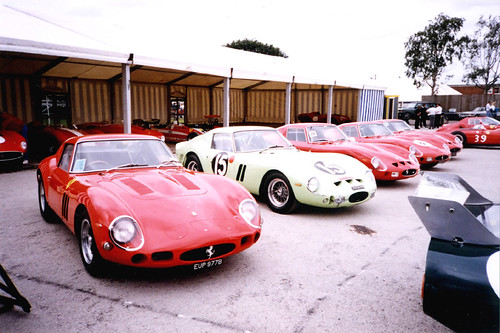
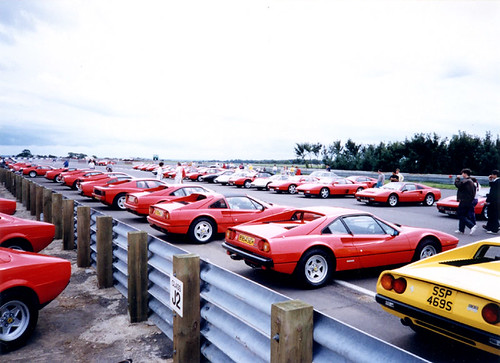
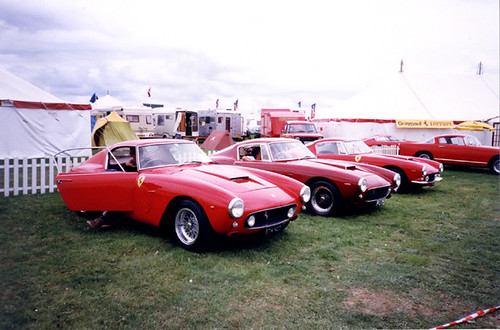
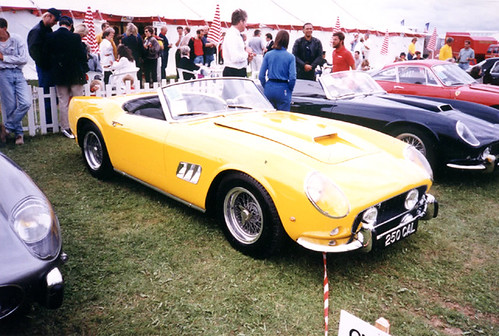





No comments:
Post a Comment